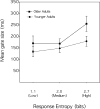Linguistic Context Versus Semantic Competition in Word Recognition by Younger and Older Adults With Cochlear Implants
- PMID: 28700448
- PMCID: PMC5741484
- DOI: 10.1097/AUD.0000000000000469
Linguistic Context Versus Semantic Competition in Word Recognition by Younger and Older Adults With Cochlear Implants
Abstract
Objectives: The increasing numbers of older adults now receiving cochlear implants raises the question of how the novel signal produced by cochlear implants may interact with cognitive aging in the recognition of words heard spoken within a linguistic context. The objective of this study was to pit the facilitative effects of a constraining linguistic context against a potential age-sensitive negative effect of response competition on effectiveness of word recognition.
Design: Younger (n = 8; mean age = 22.5 years) and older (n = 8; mean age = 67.5 years) adult implant recipients heard 20 target words as the final words in sentences that manipulated the target word's probability of occurrence within the sentence context. Data from published norms were also used to measure response entropy, calculated as the total number of different responses and the probability distribution of the responses suggested by the sentence context. Sentence-final words were presented to participants using a word-onset gating paradigm, in which a target word was presented with increasing amounts of its onset duration in 50 msec increments until the word was correctly identified.
Results: Results showed that for both younger and older adult implant users, the amount of word-onset information needed for correct recognition of sentence-final words was inversely proportional to their likelihood of occurrence within the sentence context, with older adults gaining differential advantage from the contextual constraints offered by a sentence context. On the negative side, older adults' word recognition was differentially hampered by high response entropy, with this effect being driven primarily by the number of competing responses that might also fit the sentence context.
Conclusions: Consistent with previous research with normal-hearing younger and older adults, the present results showed older adult implant users' recognition of spoken words to be highly sensitive to linguistic context. This sensitivity, however, also resulted in a greater degree of interference from other words that might also be activated by the context, with negative effects on ease of word recognition. These results are consistent with an age-related inhibition deficit extending to the domain of semantic constraints on word recognition.
Conflict of interest statement
Conflicts of Interest: There are no conflicts of interest to report.
Figures


Similar articles
-
Expectation and entropy in spoken word recognition: effects of age and hearing acuity.Exp Aging Res. 2013;39(3):235-53. doi: 10.1080/0361073X.2013.779175. Exp Aging Res. 2013. PMID: 23607396 Free PMC article.
-
Word recognition within a linguistic context: effects of age, hearing acuity, verbal ability, and cognitive function.Ear Hear. 2012 Mar-Apr;33(2):250-6. doi: 10.1097/AUD.0b013e31822f680f. Ear Hear. 2012. PMID: 21918453 Free PMC article.
-
The Two Sides of Linguistic Context: Eye-Tracking as a Measure of Semantic Competition in Spoken Word Recognition Among Younger and Older Adults.Front Hum Neurosci. 2020 Apr 9;14:132. doi: 10.3389/fnhum.2020.00132. eCollection 2020. Front Hum Neurosci. 2020. PMID: 32327987 Free PMC article.
-
Recognition of lexically controlled words and sentences by children with normal hearing and children with cochlear implants.Ear Hear. 2002 Oct;23(5):450-62. doi: 10.1097/00003446-200210000-00007. Ear Hear. 2002. PMID: 12411778
-
Gated Word Recognition by Postlingually Deafened Adults With Cochlear Implants: Influence of Semantic Context.J Speech Lang Hear Res. 2018 Jan 22;61(1):145-158. doi: 10.1044/2017_JSLHR-H-17-0141. J Speech Lang Hear Res. 2018. PMID: 29242894
Cited by
-
Effects of Age on Cortical Tracking of Word-Level Features of Continuous Competing Speech.Front Neurosci. 2021 Apr 1;15:635126. doi: 10.3389/fnins.2021.635126. eCollection 2021. Front Neurosci. 2021. PMID: 33867920 Free PMC article.
-
Adults with cochlear implants can use prosody to determine the clausal structure of spoken sentences.J Acoust Soc Am. 2021 Dec;150(6):4315. doi: 10.1121/10.0008899. J Acoust Soc Am. 2021. PMID: 34972310 Free PMC article.
-
Open-Set Phoneme Recognition Performance With Varied Temporal Cues in Younger and Older Cochlear Implant Users.J Speech Lang Hear Res. 2022 Mar 8;65(3):1196-1211. doi: 10.1044/2021_JSLHR-21-00299. Epub 2022 Feb 8. J Speech Lang Hear Res. 2022. PMID: 35133853 Free PMC article.
-
Semantic Predictability Facilitates Comprehension of Degraded Speech in a Graded Manner.Front Psychol. 2021 Sep 9;12:714485. doi: 10.3389/fpsyg.2021.714485. eCollection 2021. Front Psychol. 2021. PMID: 34566795 Free PMC article.
-
Noise-Vocoded Sentence Recognition and the Use of Context in Older and Younger Adult Listeners.J Speech Lang Hear Res. 2023 Jan 12;66(1):365-381. doi: 10.1044/2022_JSLHR-22-00184. Epub 2022 Dec 7. J Speech Lang Hear Res. 2023. PMID: 36475738 Free PMC article.
References
-
- Balota DA, Yap MJ, Cortese MJ, et al. The English Lexicon project. Behav Res Meth. 2007;39:445–459. - PubMed
-
- Başkent D, Clarke J, Pals C, et al. Cognitive compensation of speech perception with hearing impairment, cochlear implants, and aging: How and to what degree can it be achieved? Trends Hear. 2016;20 doi: 10.1177/2331216516670279. - DOI
-
- Bhargava P, Gaudrain E, Başkent D. Top-down restoration of speech in cochlear-implant users. Hear Res. 2014;309:113–123. - PubMed
-
- Bilger RC, Nuetzel MJ, Rabinowitz WM, Rzeckowski C. Standardization of a test of speech perception in noise. J Speech Hear Res. 1984;27:32–48. - PubMed
Publication types
MeSH terms
Grants and funding
LinkOut - more resources
Full Text Sources
Other Literature Sources
Medical

